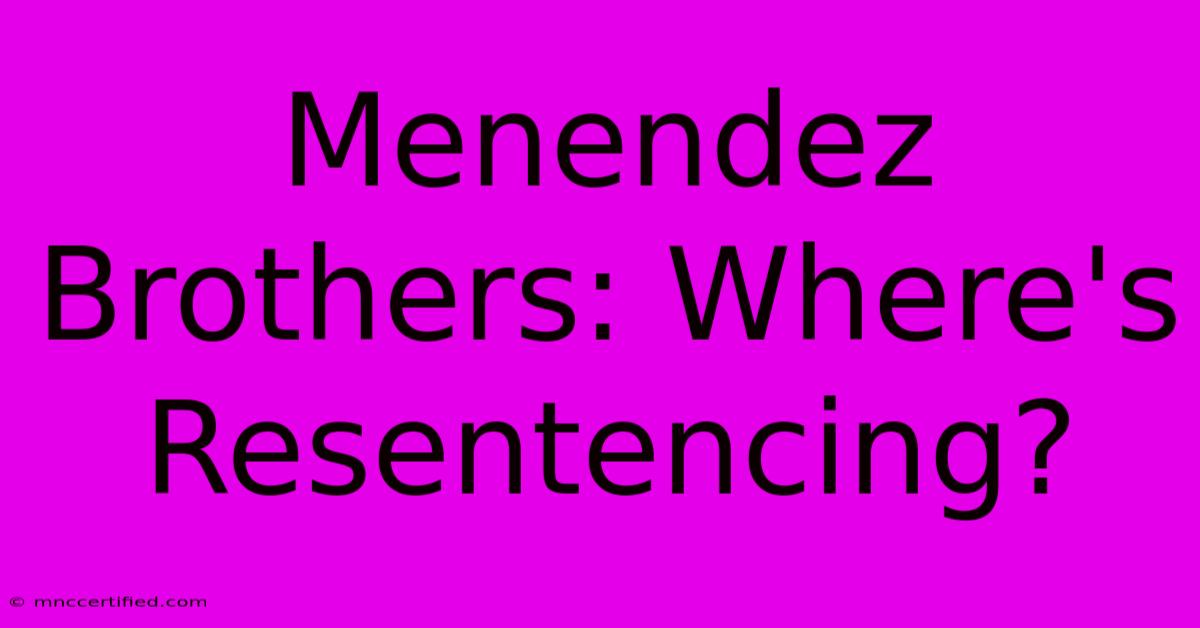Menendez Brothers: Where's Resentencing?

Table of Contents
Menendez Brothers: Where's the Resentencing? A Look at the Ongoing Legal Battle
The Menendez brothers, Lyle and Erik, gained notoriety for the brutal murder of their parents in 1989. Their subsequent trial, convictions, and life sentences captivated the nation, sparking intense debate about wealth, family dysfunction, and the complexities of the justice system. While their convictions remain, the question of resentencing continues to generate headlines and legal maneuvering. This article delves into the current status of their case, exploring the arguments for and against resentencing, and examining the legal obstacles involved.
The Original Trial and Convictions: A Recap
Lyle and Erik Menendez were found guilty of first-degree murder in 1996, receiving life sentences without the possibility of parole. Their initial trial was highly publicized, marked by intense media scrutiny and conflicting narratives. The defense argued that the brothers acted in self-defense, claiming years of abuse at the hands of their parents. However, the prosecution successfully countered this argument, presenting evidence of financial motive and the brothers' subsequent lavish spending spree.
This initial trial resulted in a mistrial, leading to a second trial which resulted in the guilty verdicts and subsequent life sentences. The case remains a complex and controversial one, particularly regarding the validity and impact of the abuse claims.
The Push for Resentencing: Exploring the Arguments
The ongoing efforts to achieve resentencing for the Menendez brothers stem from several factors:
Changes in California Law:
Significant changes in California sentencing laws since their original convictions have opened the door for appeals and potential resentencing. These changes relate to juvenile sentencing, addressing concerns about the disproportionate punishment of young offenders and the potential for rehabilitation. While the Menendez brothers were not technically juveniles at the time of the crime, the evolving understanding of adolescent brain development and its implications for criminal responsibility has fueled arguments for reconsideration of their sentences.
Claims of Ineffective Counsel:
Another argument frequently raised in support of resentencing centers on claims of ineffective counsel during the original trials. The brothers' defense team has been criticized for certain strategic decisions and overall performance. These criticisms, while not necessarily guaranteeing a successful resentencing, contribute to the ongoing legal challenges.
Public Opinion and Media Influence:
Public opinion regarding the Menendez brothers remains deeply divided. While many view them as cold-blooded killers who deserve their punishment, others express sympathy given the claims of abuse. Media coverage continues to fuel this debate, influencing public perceptions and adding pressure to the legal system.
The Obstacles to Resentencing: Why it's a Difficult Battle
Despite the arguments for resentencing, several significant hurdles remain:
-
The Severity of the Crime: The brutal nature of the murders committed by the Menendez brothers remains a central factor. Overcoming the public perception and legal precedent related to such heinous crimes is a monumental task.
-
Proof of Ineffective Counsel: Demonstrating ineffective counsel to a degree that warrants resentencing requires substantial evidence and legal expertise. Simply pointing out errors in the original defense strategy is insufficient; demonstrating that those errors prejudiced the outcome significantly is crucial.
-
Legal Precedent and Judicial Discretion: Judges have considerable discretion in sentencing. While legal changes might create avenues for appeals, ultimately the judge retains significant power in determining whether resentencing is warranted.
The Current Status and Future Outlook
The legal battles surrounding the Menendez brothers' resentencing are ongoing. The complexity of the case, the intertwined legal and public opinion factors, and the high bar for successful appeals make a definitive outcome uncertain. While changes in California law offer a potential pathway for resentencing, the obstacles remain significant, and the possibility of a successful outcome remains highly contested.
Keywords: Menendez brothers, resentencing, Lyle Menendez, Erik Menendez, California sentencing laws, juvenile sentencing, ineffective counsel, first-degree murder, appeal, legal battle, crime, justice system, self-defense, abuse, media coverage, public opinion.

Thank you for visiting our website wich cover about Menendez Brothers: Where's Resentencing?. We hope the information provided has been useful to you. Feel free to contact us if you have any questions or need further assistance. See you next time and dont miss to bookmark.
Featured Posts
-
Winter Weather Update Fox Thanksgiving
Nov 26, 2024
-
Father Of Missing Hannah Kobayashi Found Dead
Nov 26, 2024
-
Band Aid 1984 Geldofs Memories Ed
Nov 26, 2024
-
Health Insurance Broker Spokane
Nov 26, 2024
-
Aj Finley Tampa Bay Bolts Release
Nov 26, 2024